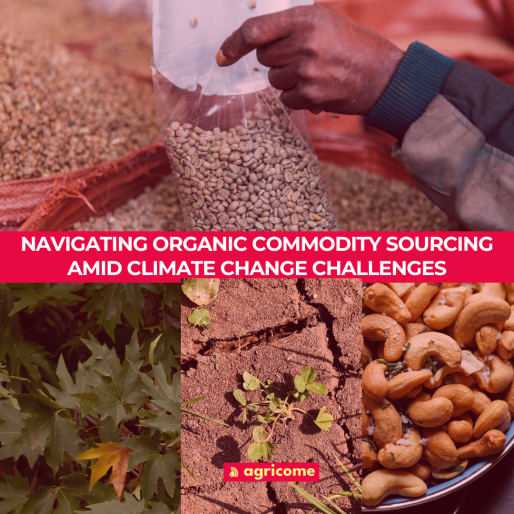The global demand for organic commodities is on the rise, driven by increasing consumer awareness of health, environmental sustainability, and ethical sourcing. For West Africa, this presents a significant opportunity. However, the challenges posed by climate change—erratic rainfall, prolonged droughts, soil degradation, and rising temperatures—threaten the viability of organic farming. This article explores strategies for farmers, wholesalers, and industry stakeholders to navigate organic commodity sourcing amid climate change challenges in West Africa.
Organic farming emphasizes sustainable practices such as crop rotation, composting, and natural pest control, which align with traditional farming methods in West Africa. By avoiding synthetic fertilizers and pesticides, organic farming reduces environmental pollution, preserves biodiversity, and improves soil health. According to the International Federation of Organic Agriculture Movements (IFOAM), organic farming can also enhance resilience to climate change by promoting soil carbon sequestration and water retention strategies (IFOAM, 2020).
West Africa is one of the regions most vulnerable to climate change. The Intergovernmental Panel on Climate Change (IPCC) reports that rising temperatures and unpredictable rainfall patterns already affecting crop yields and livestock productivity (IPCC, 2021). For instance, cocoa production in Ghana and Côte d’Ivoire, which accounts for over 60% of global supply, is under threat due to prolonged droughts and pest outbreaks. In Nigeria, rising temperatures, erratic rainfall patterns, prolonged droughts, and also increased pest infestations are disrupting farming cycles and reducing yields. The Lake Chad Basin, a critical agricultural region, has shrunk by 90% over the past decades due to climate change, affecting millions of farmers. These challenges are particularly acute for organic farming, which relies heavily on natural ecosystems and stable climatic conditions.
Strategies for Sustainable Organic Sourcing;
- CLIMATE-SMART AGRICULTURE (CSA)
CSA integrates sustainable practices such as agroforestry, conservation tillage, and integrated pest management to enhance resilience to climate change. For example, planting shade trees in cocoa farms not only reduces temperature stress but also improves soil fertility and biodiversity (World Bank, 2020). - CAPACITY BUILDING AND TRAINING
Farmers need training on organic farming techniques and climate adaptation strategies. Organizations like the West African Organic Network (WAON) and the Alliance for Green Revolution in Africa (AGRA) are already providing resources and workshops to provide organic inputs. - ACCESS TO FINANCIAL INSTITUTIONS AND TECHNOLOGY
Smallholder farmers often struggle to afford organic certification and climate-resilient technologies. Governments should implement policies that encourage financial institutions to provide affordable loans and financial facilities, while private sector stakeholders can complement these efforts with grants and technical support. - STRENGTHENING SUPPLY CHAINS
Wholesalers and exporters play a critical role in ensuring the quality and traceability of organic commodities. By investing in cold storage facilities, efficient transportation, and blockchain technology, stakeholders can reduce post-harvest losses and meet international standards. - POLICY SUPPORT AND COLLABORATION
Governments should create enabling policies that promote organic farming and climate adaptation. This includes providing subsidies for organic inputs, enforcing land-use regulations, and fostering public-private partnerships. Regional collaboration through organizations like ECOWAS can also facilitate knowledge sharing and resource mobilization. Navigating organic commodity sourcing amid climate challenges in West Africa demands a strategic, stakeholder-driven approach. Investing in climate-smart practices, capacity building, and resilient supply chains will unlock organic farming’s full potential for sustainability and economic growth. With rising global demand for ethical products, West Africa can position itself as a major player in organic agriculture.
REFERENCES
- IFOAM (2020). Organic Agriculture and Climate Change.
- FiBL & IFOAM (2021). The World of Organic Agriculture: Statistics and Emerging Trends.
- IPCC (2021). Climate Change 2021: The Physical Science Basis.
- World Bank (2020). Climate-Smart Agriculture in West Africa.
